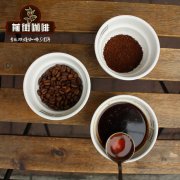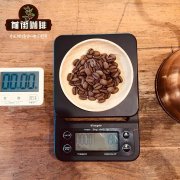Yunnan small Coffee Bean brewing suggestion sharing the difference between Iron truck and Katim Coffee varieties

Professional coffee knowledge exchange more coffee bean information please follow the coffee workshop (Wechat official account cafe_style)
Yunnan small coffee beans are iron pickup or Katim? What is the difference between the flavor of solarization, washing and honey treatment?
At present, the coffee varieties in Yunnan are Bobang, Tippika, and Katim, all of which belong to the Arabica series. Tin card and Katim are common in the market, in which tin card is an old variety, with small beans and a real small grain of coffee, while Katim has cultivated many new varieties, such as Katim AA, Katim small round beans, Katim sun, Katim honey treatment, all belong to Katim, and have a larger body. So at present, the common variety on the "Yunnan small grain" market is Katim.
Yunnan small-grain coffee, Rubiaceae, coffee genus, the planting area is mainly distributed in Lincang, Baoshan, Simao, Xishuangbanna, Dehong, Nujiang and other states. Small grains of coffee are native to Ethiopia or Arabian Peninsula. It is cultivated in Fujian, Guangdong, Hainan, Guangxi, Sichuan, Guizhou and Yunnan. Superior geographical conditions make the coffee industry in Yunnan develop rapidly. In 2014, both planting area and output accounted for more than 99% of the country's total.
The origin of Yunnan small-grain coffee:
In 1892, French missionary Father Tian succeeded in growing coffee in a place called Zhukula in Yunnan. Up to now, there are still 24 coffee trees which are more than 90 years old in Zhukula Township. Zhu Kula is a mysterious, legendary and beautiful natural village, which belongs to the Zhukula Village Committee of Pingchuan Town, Binchuan County, Dali Prefecture. It is located on the bank of the Yubao River, a tributary of the Jinsha River. It is a place at the junction of Dali Prefecture, Chuxiong Prefecture and Lijiang City.
More than 100 years ago, Zhu Kula called "Ruokelai" (Yi language), which means crooked mountain road. In 1892, due to the arrival of the French missionary Father Tian, he combined the essence of Yi language with the romance of the French, so the name Zhu Kula came into being, and later generations translated it as "heaven on earth".
According to reports, in 1892, French missionary Father Tian used coffee fruit to breed the first coffee tree outside the church, and then cultivated more coffee trees and planted them around the church. Since then, the village of Zhukula began to grow coffee, and the village has been surrounded by coffee trees ever since. Qi Guanghui and Li Fusheng, the two oldest elders in the village, are both in their eighties this year, and together they have witnessed the formation of the oldest coffee forest in China.
Although Zhu Kula is poor and backward, it has an inextricable bond with coffee. In addition to growing coffee all over the country, the villagers all have a tradition of drinking coffee: self-growing, self-grinding and self-brewing, and now men, women and children in the village have the habit of drinking coffee. The villagers here have a special feeling for the coffee tree, even if the coffee beans do not bring them any economic benefits, the villagers are not willing to cut down a coffee tree.
Zhukula Village receives guests with local coffee and walnuts, although the coffee made from earthen cans is not the best, but this primitive drinking method reflects the love of coffee among Zhukula villagers and is the highest etiquette reception for guests. The unique and rich original coffee culture makes everyone who knows Zhu Kula have to sigh that it is worthy of the first coffee village in China. Zhukula coffee forest belongs to Arabica bean (Arabica) Yunnan small grain Bobang (bourbon) and Tiebika (Typica) varieties.
By 2014, the coffee planting area of Yunnan Province is 1.83 million mu, and it is estimated that the coffee planting area of Yunnan Province will reach 2.8 million mu by 2020.
In 1892, French missionary Father Tian succeeded in growing coffee in a place called Zhukula in Yunnan. Up to now, there are still 24 coffee trees which are more than 90 years old in Zhukula Township. Zhukula coffee forest belongs to Arabica bean (Arabica) Yunnan small grain Bobang (bourbon) and Tiebika (Typica) varieties. At present, the Arabica coffee garden planted in Yunnan has exceeded 21000 hectares. Small-grain coffee is suitable for growing in the mountain area of 800 meters above sea level. If the altitude is too high, it will taste sour, and if it is too low, it will taste bitter. Small grains of coffee are mostly planted in dry and hot valleys about 1100 meters above sea level, so they are moderately sour, rich and mellow.
1. Iron pickup: clean, smooth and well-balanced
two。 Katim AA: balanced in texture, soft and bright in the mouth, slightly fruity
3. Katim beans: full-bodied, nutty, mellow in the mouth
4. Katim sun: taste balanced, sweet and round, black tea tail rhyme
5. Katim honey treatment: sweet and sour fruit, vanilla, lively and changeable flavor
The above "flavor description map" and "flavor introduction" (the overall impression of aroma, acidity, bitterness, sweetness and mellowness) have been explained in detail. I believe everyone has a general understanding of the different characteristics of each bean.
On the whole, the flavor of each bean is different and has its own characteristics:
01. Iron pickup (old variety)
The oldest variety of beans in Yunnan, close to the original variety. The tree has the advantages of high age, low yield, high bean quality, clean taste and balanced, soft and smooth flavor.
02. Katim AA (large particles)
AA refers to grade, coffee beans are between 16 and 18 mesh in size, with weak acidity and bright texture.
03. Katim round beans (round beans)
Coffee beans generally grow in twin cells, while round beans belong to single cells). Generally speaking, they absorb more "sun and moon essence" than flat beans, and all taste is relatively mellow and full-bodied, and Huigan is also very good.
04. Katim sun (natural drying)
Tanning is a treatment, also known as "natural drying, this taste is more rich, sweet, round, sweet." It is my personal preference, with the sweet and sour fruit and the fermented smell of red wine.
05. Katim honey treatment (high sweetness)
Katim honey treatment (honey treatment is the treatment, honey treatment is divided into red honey treatment, and black honey treatment), using all-red fruit. The advantages of this one are high sweetness, cleanliness, rich, lively and changeable flavor.
6. Kaddura (new variety)
The taste is balanced, the bitter and sour taste is balanced, and the taste is sweet.
When it comes to treatment, you might ask, what is the difference in taste between them?
1. Washing / WASH (simple taste): emphasize brightness, acidity and floral fragrance
two。 Honey treatment / HONEY (like eating dried fruit): emphasize sweetness, fruit taste
3. Sun treatment / NATURAL (taste of sunshine): emphasize rich, sour and sweet
The above varieties and treatments are common in daily life, among which a very unique Yunnan bean "Kaddura" (a new variety) has been produced this year, which is planted as high as 1600 meters above sea level. "balanced taste, balanced bitterness and sweet taste", much like "Jamaica Blue Mountain" coffee (the price of raw beans of Blue Mountain coffee has risen to nearly 1000 soft sister dollars / kg this year), after baking and packaging, the market price per pound is not less than 1000 soft sister dollars). If you can't afford to drink Blue Mountain friends, you might as well drink this "Kaddura"! -- because the sex-to-price ratio of this coffee bean is really very high, the annual output of raw beans is only more than 100 kilograms (we all know that the output of good coffee beans is very low). Of course, the quality of this bean is also very high. It has refreshed my values on Yunnan beans, no exaggeration, and I feel like I have made a qualitative leap. The prospect of this bean will be very good!
Qianjie recommended cooking:
Filter cup: Hario V60
Water temperature: 90 degrees
Degree of grinding: small Fuji 3.5
Cooking methods: the ratio of water to powder is 1:15, 15g powder, the first injection of 25g water, 25 s steaming, the second injection to 120g water cut off, waiting for the powder bed water to half and then water injection, slow water injection until 225g water, extraction time about 2:00
Analysis: using three-stage brewing to clarify the flavor of the front, middle and back of the coffee. Because the V60 has many ribs and the drainage speed is fast, it can prolong the extraction time when the water is cut off.
Important Notice :
前街咖啡 FrontStreet Coffee has moved to new addredd:
FrontStreet Coffee Address: 315,Donghua East Road,GuangZhou
Tel:020 38364473
- Prev

Yunnan Pu 'er Coffee Production Area| Aini Manor Guixia, Kadulla, Kaduai, Katim, Vera
Professional coffee knowledge exchange More coffee bean information Please pay attention to coffee workshop (Weixin Official Accounts cafe_style) Yunnan Pu 'er coffee producing area| Aini Manor Guixia, Kadura, Kaduai, Katim, Velasaki varieties of planting environment? Aini Group has been rooted in Pu 'er coffee producing area for nearly 30 years. At this coffee fair, Aini Manor has successfully planted Guixia in six years.
- Next

Hawaii Queen Manor 100% Kona Queen Kona Coffee Bean Flavor Features _ Queen Manor Information
Professional coffee knowledge exchange more coffee bean information please follow the coffee workshop (Wechat official account cafe_style) coffee Extra Fancy is Hawaiian coffee Kona coffee bean classification, belongs to the highest grade of beans, compared with other Kona coffee beans, Extra Fancy beans are brighter, glossy, and have a smoother taste and perfect balance
Related
- Detailed explanation of Jadeite planting Land in Panamanian Jadeite Manor introduction to the grading system of Jadeite competitive bidding, Red bid, Green bid and Rose Summer
- Story of Coffee planting in Brenka region of Costa Rica Stonehenge Manor anaerobic heavy honey treatment of flavor mouth
- What's on the barrel of Blue Mountain Coffee beans?
- Can American coffee also pull flowers? How to use hot American style to pull out a good-looking pattern?
- Can you make a cold extract with coffee beans? What is the right proportion for cold-extracted coffee formula?
- Indonesian PWN Gold Mandrine Coffee Origin Features Flavor How to Chong? Mandolin coffee is American.
- A brief introduction to the flavor characteristics of Brazilian yellow bourbon coffee beans
- What is the effect of different water quality on the flavor of cold-extracted coffee? What kind of water is best for brewing coffee?
- Why do you think of Rose Summer whenever you mention Panamanian coffee?
- Introduction to the characteristics of authentic blue mountain coffee bean producing areas? What is the CIB Coffee Authority in Jamaica?

